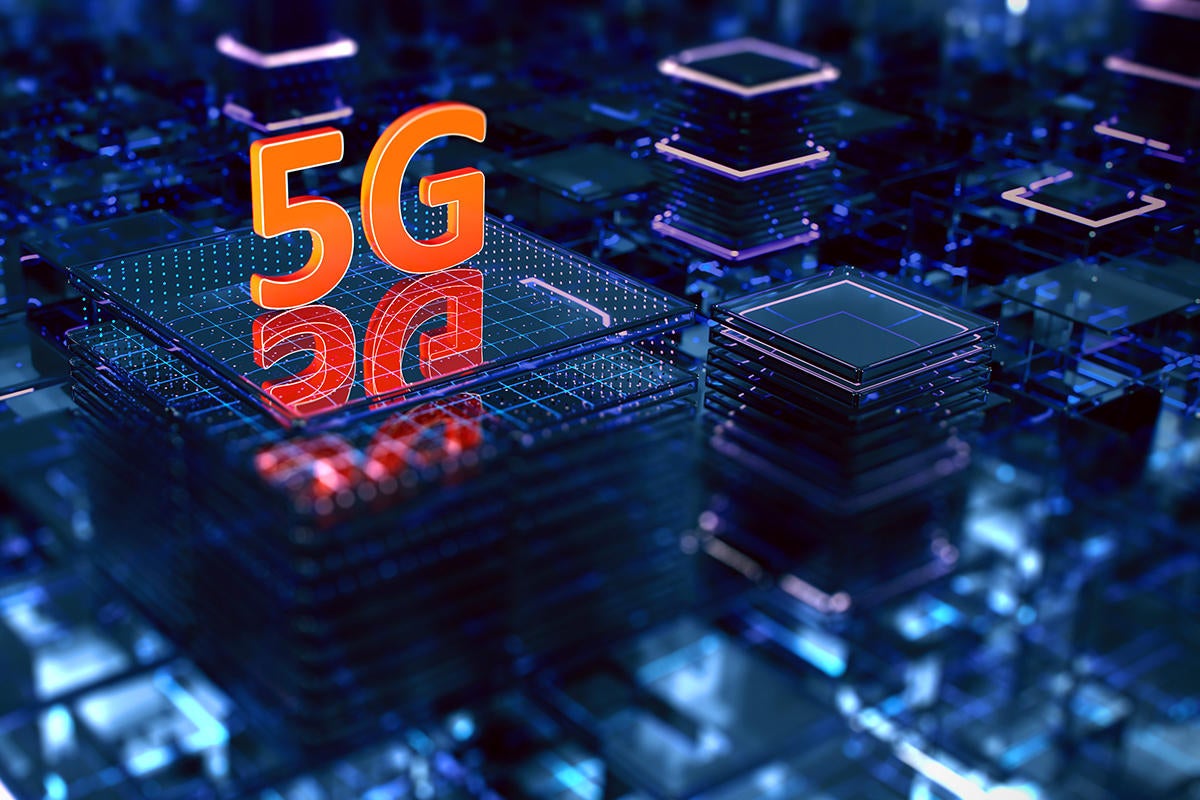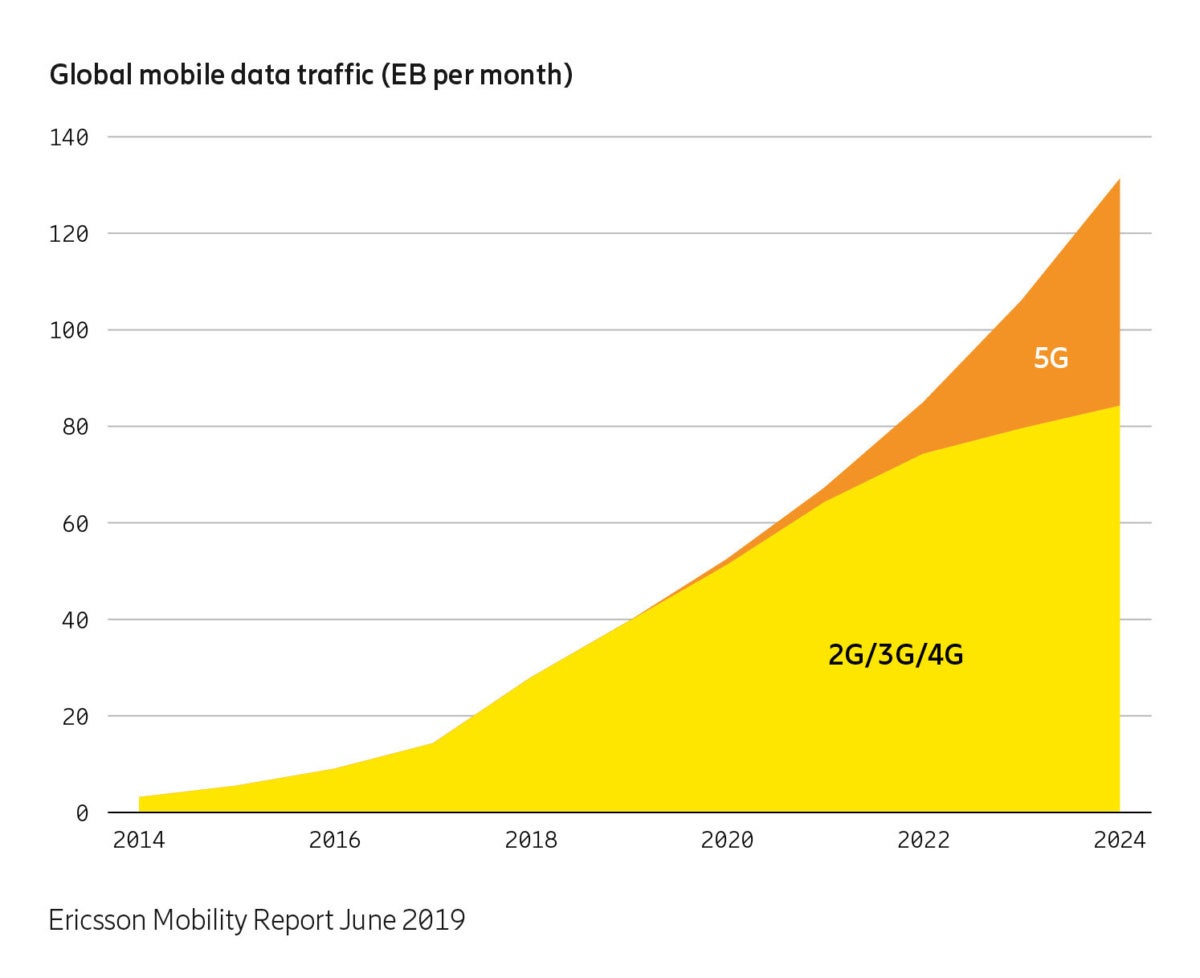7.7 KiB
17 predictions about 5G networks and devices
Not surprisingly, the new Ericsson Mobility Report is bullish on the potential of 5G technology. Here’s a quick look at the most important numbers.

“As market after market switches on 5G, we are at a truly momentous point in time. No previous generation of mobile technology has had the potential to drive economic growth to the extent that 5G promises. It goes beyond connecting people to fully realizing the Internet of Things (IoT) and the Fourth Industrial Revolution.” —The opening paragraph of the June 2019 Ericsson Mobility Report
Almost every significant technology advancement now goes through what Gartner calls the “hype cycle.” These days, Everyone expects new technologies to be met with gushing optimism and dreamy visions of how it’s going to change the world in the blink of an eye. After a while, we all come to expect the vendors and the press to go overboard with excitement, at least until reality and disappointment set in when things don’t pan out exactly as expected.
[ Also read:The time of 5G is almost here ]
Even with all that in mind, though, Ericsson’s whole-hearted embrace of 5G in its Internet Mobility Report is impressive. The optimism is backed up by lots of numbers, but they can be hard to tease out of the 36-document. So, let’s recap some of the most important top-line predictions (with my comments at the end).
Worldwide 5G growth projections
- “More than 10 million 5G subscriptions are projected worldwide by the end of 2019.”
- “[We] now expect there to be 1.9 billion 5G subscriptions for enhanced mobile broadband by the end of 2024. This will account for over 20 percent of all mobile subscriptions at that time. The peak of LTE subscriptions is projected for 2022, at around 5.3 billion subscriptions, with the number declining slowly thereafter.”
- “In 2024, 5G networks will carry 35 percent of mobile data traffic globally.”
- “5G can cover up to 65 percent of the world’s population in 2024.”
- ”NB-IoT and Cat-M technologies will account for close to 45 percent of cellular IoT connections in 2024.”
- “By the end of 2024, nearly 35 percent of cellular IoT connections will be Broadband IoT, with 4G connecting the majority.” But 5G connections will support more advanced use cases.
- “Despite challenging 5G timelines, device suppliers are expected to be ready with different band and architecture support in a range of devices during 2019.”
- “Spectrum sharing … chipsets are currently in development and are anticipated to be in 5G commercial devices in late 2019."
- “VoLTE is the foundation for enabling voice and communication services on 5G devices. Subscriptions are expected to reach 2.1 billion by the end of 2019. … The number of VoLTE subscriptions is projected to reach 5.9 billion by the end of 2024, accounting for more than 85 percent of combined LTE and 5G subscriptions.”
Regional 5G projections
- “In North America, … service providers have already launched commercial 5G services, both for fixed wireless access and mobile. … By the end of 2024, we anticipate close to 270 million 5G subscriptions in the region, accounting for more than 60 percent of mobile subscriptions.”
- “In Western Europe … The momentum for 5G in the region was highlighted by the first commercial launch in April. By the end of 2024, 5G is expected to account for around 40 percent of mobile subscriptions.
- In Central and Eastern Europe, … The first 5G subscriptions are expected in 2019, and will make up 15 percent of subscriptions in 2024.”
- “In North East Asia, … the region’s 5G subscription penetration is projected to reach 47 percent [by the end of 2024].
- “[In India,] 5G subscriptions are expected to become available in 2022 and will represent 6 percent of mobile subscriptions at the end of 2024.”
- “In the Middle East and North Africa, we anticipate commercial 5G deployments with leading communications service providers during 2019, and significant volumes in 2021. … Around 60 million 5G subscriptions are forecast for the end of 2024, representing 3 percent of total mobile subscriptions.”
- “Initial 5G commercial devices are expected in the [South East Asia and Oceania] region during the first half of 2019. By the end of 2024, it is anticipated that almost 12 percent of subscriptions in the region will be for 5G.]”
- “In Latin America … the first 5G deployments will be possible in the 3.5GHz band during 2019. Argentina, Brazil, Chile, Colombia, and Mexico are anticipated to be the first countries in the region to deploy 5G, with increased subscription uptake forecast from 2020. By the end of 2024, 5G is set to make up 7 percent of mobile subscriptions.”
Is 5G really so inevitable?
Considered individually, these predictions all seem perfectly reasonable. Heck, 10 million 5G subscriptions is only a drop in the global bucket. And rumors are already flying that Apple’s next round of iPhones will include 5G capability. Also, 2024 is still five years in the future, so why wouldn’t the faster connections drive impressive traffic stats? Similarly, North America and North East Asia will experience the fastest 5G penetration.
But when you look at them all together, these numbers project a sense of 5G inevitability that could well be premature. It will take a lot of spending, by a lot of different parties—carriers, chip makers, equipment vendors, phone manufacturers, and consumers—to make this kind of growth a reality.
I’m not saying 5G won’t take over the world. I’m just saying that when so many things have to happen in a relatively short time, there are a lot of opportunities for the train to jump the tracks. Don’t be surprised if it takes longer than expected for 5G to turn into the worldwide default standard Ericsson—and everyone else—seems to think it will inevitably become.
Join the Network World communities on Facebook and LinkedIn to comment on topics that are top of mind.
via: https://www.networkworld.com/article/3403358/17-predictions-about-5g-networks-and-devices.html
作者:Fredric Paul 选题:lujun9972 译者:译者ID 校对:校对者ID
